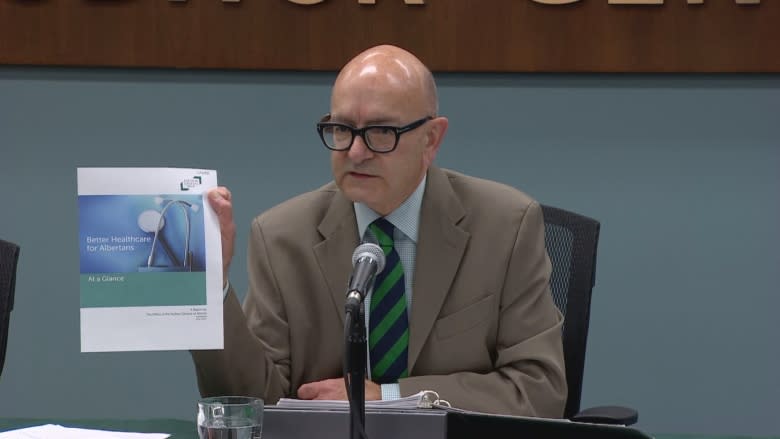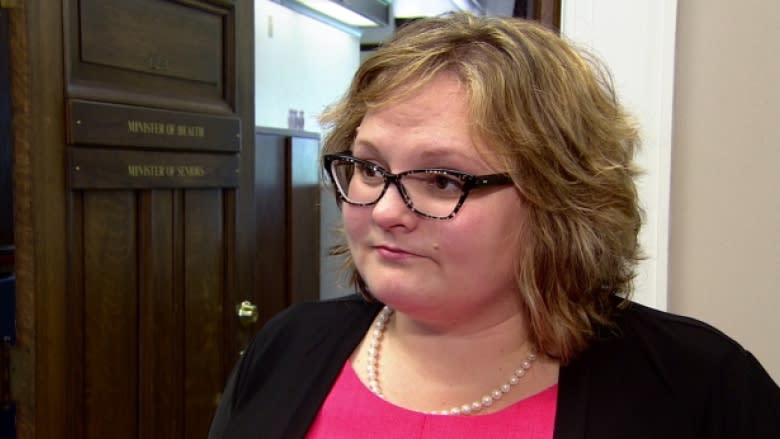Alberta's health system needs overhaul, auditor general says
Alberta's auditor general has ideas to fix the province's fragmented health-care system and says the public and medical professionals should be an integral part of the reforms.
Merwan Saher and a team of auditors released a report Thursday titled Better Healthcare for Albertans, which outlines a plan they say won't cost more money.
The report highlights what Alberta has been doing wrong and looks at other jurisdictions that have been successful in using a team-based, integrated health system, an idea that has been floated since the mid-1990s.
Saher said the goal is to "take the entire health system to a higher level, to make a quantum leap rather than continuing to make incremental change, reorganizing or moving in circles."
Each patient would get a tailor-made, long-term health plan with input from various specialists, and all specialists would have access to a patient's health records.
Patients should be able to access their health information online, Saher said. Currently, people don't have direct access to their information and their health records are not made available to new doctors.
Health Minister Sarah Hoffman said she supports a seamless flow of information for those who need it.
"To be able to access all of the files you have with your primary care provider can be very challenging," she said Thursday.
Hoffman agreed with the auditor general that sharing health records was important "to ensure people making decisions have all the information."
Alberta's primary care networks have made an attempt at this with multidisciplinary teams of nurses, social workers, respiratory therapists, exercise specialists and registered dietitians.
Alberta has some of the best medical professionals in the world, Saher said, but the system is disconnected.
Why it's not working
The report outlined reasons the current system doesn't work: the structure is fragmented; the relationship between the department of Health, Alberta Health Services and medical professionals is disconnected; and doctors and other health-care professionals don't share information.
Saher said the "fee for service" method of paying doctors is a problem, as it pays physicians for volume and complexity but "doesn't consider the quality of those services and their impact on total health-care costs."
He also pointed out that Alberta Health isn't clear on what it expects from doctors for the money it spends, giving doctors little incentive to go the extra mile.
"Most physicians do not monitor a patient's health status between visits or proactively contact patients to remind them when tests, procedures or medication reviews are due."
Saher drew parallels to other service providers, such as car dealerships that call customers when the vehicle needs an oil change, or a vet who will remind owners their family pet is due for a vaccination.
"Yet Albertans rarely receive the same level of service from our health-care system."
Alberta Liberal Leader David Swann lauded the auditor general's "insightful and timely analysis" in the report, which also shows the need to co-ordinate primary, acute and continuing care.
"We need to reduce barriers to care, involve people in their health-care decisions, and make sure the right level and quality of care is being provided in the right place by the right health professional at the right time," Swann said.
Past audits
The report is not an audit for the government — the usual job of the auditor general's office.
Given that 41 outstanding recommendations from past audits still haven't been implemented, Saher tried a different approach to get his message across.
Though Alberta Health Services has implemented some recommendations from numerous previous audits, Saher said his office has noticed an "unfortunate pattern."
"Weaknesses noted in our audit findings keep emerging and re-emerging over time because their root causes... are not being resolved."
The report also outlines who needs to participate in the "transformation" project. The government must take the lead by discussing what's possible with Albertans, and by making the "difficult decision" on funding and structure.
MLAs need to think long-term.
The Wildrose Party responded to the report by urging the NDP government to adopt the recommendations.
"For two years, the NDP government has been equating more money with a better health system," said Wildrose health critic Tany Yao. "Today we learned unequivocally that this was the wrong course of action."
Medical professionals need to make a conscious effort to support integrated care, Saher said. And regular Albertans have a responsibility to "expect care providers to measure and report the results," he said.




